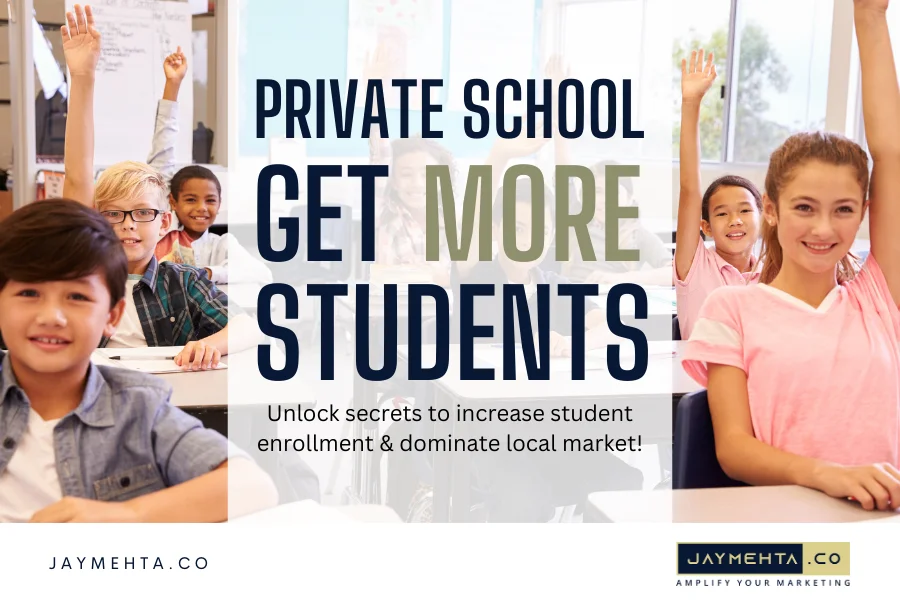In today’s competitive educational landscape, a robust school marketing strategy is no longer a luxury—it’s an absolute necessity for survival and growth. Parents are discerning consumers, carefully evaluating their options before making a significant investment in their child’s education.
To stand out from the crowd and attract the best students, private schools must effectively showcase their unique value proposition, building trust and inspiring confidence. This comprehensive guide provides proven marketing strategies for schools designed to boost enrollment, enhance brand reputation, and cultivate a thriving school community that attracts top talent.
Let’s face it: relying on word-of-mouth and traditional methods alone simply won’t cut it in the digital age. To truly thrive, you need a strategic, multifaceted approach that leverages the power of online marketing, compelling storytelling, and genuine community engagement. This guide is your roadmap to achieving that goal.
Define Your Ideal Student and Parent Persona: Understanding Your Target Audience Inside and Out
Pinpoint the Right Families for Your School’s Success
Before launching any marketing campaign or investing in fancy advertising, take the time to truly understand who you’re trying to reach. Identifying your ideal student and parent profiles is the cornerstone of effective private schools marketing. By deeply understanding their needs, values, aspirations, and pain points, you can tailor your messaging to resonate with them on a personal level, creating a powerful connection that drives enrollment.
Think of it like this: you wouldn’t try to sell a luxury sports car to someone who needs a minivan. Similarly, you can’t expect to attract the right families if you don’t know who they are and what they’re looking for.
Key Questions to Ask When Developing Your Ideal Personas
-
What are their academic priorities?
Are they seeking a rigorous, college-preparatory curriculum, or a more nurturing, individualized learning environment?
-
What extracurricular activities do they value?
Are they passionate about sports, arts, music, or community service?
-
What are their communication preferences?
Do they prefer email, social media, phone calls, or in-person meetings?
-
What are their concerns about their child’s education?
Are they worried about safety, bullying, academic pressure, or college acceptance?
-
What are their socio-economic backgrounds?
Can they comfortably afford tuition, or will they need financial aid?
-
What are their cultural values and beliefs?
Do they prioritize diversity, inclusivity, or specific religious traditions?
By answering these questions thoughtfully and gathering data through surveys, interviews, and market research, you can create detailed personas that represent your ideal families. This will enable you to craft targeted campaigns that speak directly to their needs and resonate with their values, increasing your chances of attracting the right students to your school.
Actionable Tip
Create detailed profiles for your ideal student and parent, giving them names, backgrounds, aspirations, and pain points. Refer to these personas whenever you’re making marketing decisions to ensure you’re staying focused on your target audience.
Related Blog: How to Narrow Down Your Target Audience
Craft a Compelling Brand Story: Differentiating Your School in a Sea of Options
Tell Your School’s Unique Story to Captivate Hearts and Minds
In today’s saturated market, parents are bombarded with choices. To stand out from the crowd and capture their attention, you need more than just a list of features and benefits – you need a compelling brand story that communicates your school’s unique identity and inspires trust. This is a very useful method for marketing for schools.
Your brand story is what sets your school apart, conveying your mission, values, and unique offerings in a way that captivates hearts and minds. It’s the emotional connection that resonates with prospective families, making them feel like your school is the perfect fit for their child’s future.
Key Elements of a Strong and Memorable Brand Story
-
Your School’s History and Founding Principles
Share the origins of your school, highlighting the vision and values that guided its creation. What inspired the founders to create this institution, and what challenges did they overcome along the way?
-
Your Unique Teaching Philosophy
Explain your approach to education and what makes it different from other schools. Do you emphasize hands-on learning, project-based assessments, or personalized instruction? What innovative methods do you use to engage students and foster their intellectual curiosity?
-
The Achievements of Your Alumni
Showcase the success stories of your graduates, highlighting their accomplishments in college, careers, and community leadership. This provides tangible evidence of the long-term value of your school’s education.
-
The Sense of Community Within Your School
Describe the close-knit relationships between students, faculty, staff, and parents. Highlight the supportive and inclusive environment that fosters personal growth and character development.
-
The Unique Traditions and Rituals That Make Your School Special
Are there annual events, ceremonies, or traditions that create a sense of belonging and pride within your school community? Share these stories to showcase your school’s unique culture and heritage.
Actionable Tip
Use your brand story consistently across all marketing channels, from your website and social media to your brochures and open house presentations. Ensure that your messaging is authentic, compelling, and aligned with your school’s values. Consider hiring a professional copywriter or brand strategist to help you craft a truly captivating brand story. This will aid with techniques for schools and their marketing strategies.
Related Blog: Building a Powerful Online Brand: Your Comprehensive Guide to Success
Supercharge Your Website with Strategic SEO: Becoming the Go-To Resource for Local Parents
Shine Online and Attract Your Ideal Families Through Search Engines
In today’s digital age, your website is often the first impression prospective families have of your school. Make it count by optimizing it for search engines (SEO), ensuring that you appear prominently in search results when parents are looking for the best educational options in your area. You need to know how to market a school, beginning with a website.
SEO involves strategically incorporating relevant keywords into your website’s content, titles, meta descriptions, and image alt text, telling search engines what your website is about and helping them match it with relevant user queries. It also includes building high-quality backlinks from reputable websites, improving your website’s loading speed, and ensuring it’s mobile-friendly, creating a seamless and engaging user experience for prospective families.
Key SEO Strategies to Implement Today
-
Conduct Thorough Keyword Research
Use tools like Google Keyword Planner, SEMrush, or Ahrefs to identify the terms parents are actively searching for when looking for private schools in your area. Focus on keywords related to your school’s unique offerings, such as “best private schools near me,” “STEM-focused education,” or “arts-integrated curriculum.”
-
Optimize Your Website’s Titles, Meta Descriptions, and Content
Craft compelling titles and meta descriptions that accurately reflect your website’s content and entice users to click through from search results. In your website copy, naturally incorporate your target keywords while providing valuable information to prospective families.
-
Build High-Quality Backlinks from Reputable Websites
Earn backlinks from other websites in your community, such as local businesses, parent organizations, and educational blogs. This signals to search engines that your website is a trusted and authoritative resource.
-
Ensure Your Website is Mobile-Friendly and Loads Quickly
In today’s mobile-first world, it’s crucial that your website is responsive and loads quickly on all devices. Use Google’s PageSpeed Insights tool to identify and fix any performance issues.
-
Create Compelling, Informative Content
Regularly update your website with fresh, engaging content that showcases your school’s expertise and value. This could include blog posts, articles, videos, infographics, and testimonials from satisfied parents and students.
The key to effective SEO is to provide valuable, relevant content that meets the needs of your target audience. By optimizing your website with strategic keywords and building a strong online presence, you can attract more qualified leads and increase your chances of enrolling the right students for your school. This also shows the importance of how to market a school.
Read also: How to Write Quality Content for a Website
Social Media Magic: Engaging and Connecting with Prospective Families in the Digital World
Amplify Your Online Presence and Build a Thriving School Community
In today’s digitally connected world, social media is a powerful tool for private schools seeking to engage with prospective families, showcase their school’s vibrant community, and build brand awareness. Platforms like Facebook, Instagram, YouTube, and LinkedIn offer unique opportunities to connect with parents, students, alumni, and community members, sharing your school’s story and fostering a sense of belonging.
Effective Social Media Strategies for Private Schools
-
Share Engaging Content That Highlights Student Achievements
Showcase student artwork, writing samples, science projects, and other accomplishments to demonstrate the quality of your school’s education.
-
Promote School Events and Activities
Share photos and videos from school concerts, plays, sporting events, field trips, and other activities, giving prospective families a glimpse into your school’s dynamic community.
-
Showcase Faculty Expertise and Accomplishments
Highlight the credentials, experience, and passion of your teachers and administrators, building trust and confidence among prospective families.
-
Run Targeted Ads to Reach Parents in Your Local Area
Use Facebook and Instagram ads to target parents who fit your ideal student profile, based on their location, interests, demographics, and online behavior.
-
Engage with Your Audience by Responding to Comments and Messages Promptly
Show that you value your community by responding to comments and messages promptly, answering questions, and addressing concerns.
-
Use High-Quality Images and Videos to Capture Attention
Invest in professional photography and videography to showcase your school’s facilities, faculty, and student life in the best possible light.
Platforms to Consider
-
Facebook
Great for community building, sharing news and updates, and running targeted ads.
-
Instagram
Perfect for showcasing visual content, highlighting student life, and engaging with younger audiences.
-
YouTube
Ideal for sharing videos about your school’s programs, faculty, and student success stories.
-
LinkedIn
A great platform for connecting with alumni, showcasing faculty expertise, and promoting your school’s career preparation programs.
Actionable Tip
Create a social media calendar to plan your content in advance, ensuring that you’re consistently sharing engaging and informative content that resonates with your target audience. Also be involved with the techniques for schools.
Related Blog: Building a Successful Social Media Strategy: Tips and Tricks for 2025
Harness the Power of Email Marketing: Nurturing Leads and Building Lasting Relationships
Building a Loyal Community Through Personalized Communication
While social media is great for building brand awareness and engaging with a broad audience, email marketing remains one of the most effective ways to nurture leads, build lasting relationships with prospective families, and drive enrollment. By building an email list and sending personalized messages that address their specific needs and interests, you can guide prospective families through the enrollment process, building trust and fostering a sense of connection.
Key Email Marketing Strategies for Private Schools
-
Build an Email List by Offering Valuable Resources
Entice prospective families to sign up for your email list by offering valuable resources, such as a school prospectus, a guide to choosing the right school, a checklist for preparing for the admissions process, or a free e-book on a relevant topic.
-
Segment Your Email List Based on Interests and Needs
Divide your email list into segments based on factors such as grade level, academic interests, extracurricular activities, and geographic location. This will allow you to send targeted messages that resonate with each audience segment.
-
Send Personalized Emails That Address Specific Concerns
Use the information you’ve gathered about prospective families to personalize your email messages, addressing their specific concerns and highlighting the aspects of your school that align with their needs.
-
Share Informative Articles, School Updates, and Special Offers
Regularly send email newsletters that share informative articles about education, parenting, and child development, as well as updates about your school’s programs, events, and accomplishments. Offer exclusive discounts or promotions to encourage enrollment.
-
Automate Your Email Campaigns
Use email marketing automation tools to create a series of automated emails that are triggered by specific actions, such as signing up for your email list, downloading a resource, or attending an event. This will help you nurture leads over time, ensuring that they receive the right message at the right time.
Actionable Tip
Use a professional email marketing platform like Mailchimp, Constant Contact, or ConvertKit to manage your email list, create engaging email templates, and track your results. You can do this when marketing for schools.
Find it Useful: Free Emails Resources & Guides to Grow Your Business
Showcase Your Expertise: Become a Thought Leader in Education
Attract and Engage with Valuable Content
Content marketing is a proven strategy for attracting prospective families by providing them with valuable, informative, and engaging content that showcases your school’s expertise and thought leadership.
By sharing your knowledge and insights, you can build trust with your audience, position your school as a go-to resource for education-related information, and ultimately, drive enrollment. You need to know that content is king when you need to use techniques for schools.
Effective Content Marketing Tactics for Private Schools
-
Blog Posts
Share informative articles on topics related to education, parenting, child development, and the unique aspects of your school.
-
Videos
Create videos that showcase your school’s facilities, faculty, and student life, as well as expert interviews and educational tutorials.
-
Infographics
Present data and information in a visually appealing format, such as statistics on student achievement, comparisons of different educational approaches, or tips for parents.
-
E-books and Guides
Offer in-depth resources on specific topics, such as “The Ultimate Guide to Choosing the Right Private School,” or “Preparing Your Child for College.”
-
Podcasts
Host a podcast featuring interviews with educators, parents, and alumni, discussing relevant topics and sharing insights into your school’s community and culture.
-
Webinars
Host online webinars on topics of interest to prospective families, showcasing your school’s expertise and answering questions in real-time.
Actionable Tip
Create a content calendar to plan your content in advance, ensuring that you’re consistently providing value to your audience and showcasing your school’s unique expertise. It also needs to use a good marketing strategy to attract students.
Related Blog: How to Create a Content Marketing Strategy for 2025
Dominate Your Local Market: Leveraging the Power of Local SEO for Increased Visibility
Getting Found by Local Families Searching for the Perfect School
In today’s digital age, most parents begin their search for the perfect school online. That’s why local SEO is crucial for private schools seeking to attract families in their geographic area. By optimizing your online presence to rank higher in local search results, you can ensure that your school is easily found by prospective families who are actively seeking educational options nearby. This is also a great way to increase student enrollment.
Key Local SEO Strategies for Private Schools
-
Claim and Optimize Your Google Business Profile
This is your school’s online storefront, providing essential information to prospective families, such as your name, address, phone number, website, hours of operation, and photos. Ensure that your listing is accurate, complete, and optimized with relevant keywords.
-
Ensure Your Name, Address, and Phone Number (NAP) Are Accurate and Consistent
This information should be consistent across all online platforms, including your website, social media profiles, online directories, and local listings.
-
List Your School in Relevant Online Directories
Submit your school’s information to reputable online directories, such as Yelp, Niche, GreatSchools, Private School Review, and Boarding School Review.
-
Encourage Satisfied Parents to Leave Online Reviews
Positive online reviews can significantly influence prospective families’ decisions. Encourage satisfied parents to leave reviews on Google, Yelp, and other relevant platforms.
-
Optimize Your Website for Local Keywords
Incorporate local keywords throughout your website content, such as “private school in [city],” “best schools in [county],” or “boarding schools near [state].”
Tips
-
Respond to Reviews
Whether the review is positive or negative, respond professionally and promptly. This demonstrates that you value feedback and are committed to providing excellent service.
-
Monitor Citations
Regularly check online directories and listings to ensure that your school’s NAP information is accurate and consistent.
-
Use Local Schema Markup
Implement schema markup on your website to provide search engines with more information about your school’s location, services, and contact information.
Helpful Resource: Personalization Tips to Dominate Google Local Search
Give a Real Experience: Immersive and Engaging Virtual Tours
Bring Your School to Prospective Families, Wherever They Are
In today’s fast-paced world, parents have busy schedules and may not always be able to visit your school in person. That’s why virtual tours have become an increasingly valuable tool for private schools, allowing prospective families to experience your school’s facilities, atmosphere, and unique offerings from the comfort of their own homes. They also are very vital to strategies to increase student enrollment.
Tips for Creating a Captivating Virtual Tour
-
Use High-Quality Video and Photography
Invest in professional equipment to capture stunning visuals that showcase your school’s facilities in the best possible light.
-
Showcase Key Areas of Your School
Highlight classrooms, labs, libraries, sports facilities, arts studios, and other areas that are important to prospective families.
-
Include Testimonials from Current Students and Parents
Add video clips or audio recordings of current students and parents sharing their positive experiences at your school.
-
Make the Tour Interactive
Add clickable hotspots, interactive elements, and additional information that allows users to explore specific areas of your school in more detail.
-
Optimize for Mobile Viewing
Ensure that your virtual tour is accessible and easily viewable on all devices, including smartphones and tablets.
By creating an engaging and informative virtual tour, you can provide prospective families with a compelling glimpse into your school’s unique culture and offerings, even if they can’t visit in person.
Building Relationships with Prospective Families in Person
Connect and Inspire Confidence with Open Houses
Nothing can quite replace the personal touch of an in-person interaction. Open houses and events provide invaluable opportunities for private schools to connect with prospective families, showcase their community and culture, and build lasting relationships that drive enrollment. This also allows you to use any marketing strategy to attract students.
Tips for Hosting Successful Open Houses and Events
-
Create a Welcoming and Inviting Atmosphere
Make sure your school is clean, organized, and visually appealing. Greet prospective families with a warm welcome and provide them with clear information about the event.
-
Provide Informative Presentations and Tours
Offer presentations from your head of school, faculty, and current students, highlighting your school’s unique programs, teaching philosophy, and student success stories. Provide guided tours of your facilities, showcasing key areas of interest.
-
Offer Opportunities to Meet with Faculty, Staff, and Current Students
Encourage prospective families to interact with your faculty, staff, and current students, answering their questions and providing them with a firsthand perspective of your school’s community and culture.
-
Provide Refreshments and Activities
Offer light refreshments and engaging activities for children to create a fun and memorable experience for the whole family.
-
Follow Up with Attendees After the Event
Send a personalized email to each attendee, thanking them for coming and providing them with additional information about your school. Offer to schedule a personal tour or consultation to continue the conversation.
Actionable Tip
Collect contact information from all attendees at your open houses and events, adding them to your email list to nurture them with ongoing communication and updates.
The Power of Data-Driven Decisions: Measuring and Analyzing Your Marketing Results for Continuous Improvement
Making Informed Choices: Track Your Marketing Progress
Marketing, especially marketing strategies for schools, is not a set-it-and-forget-it endeavor. To ensure that your efforts are yielding the desired results, you need to consistently monitor your progress, analyze your data, and make data-driven decisions to optimize your strategies.
Key Metrics to Track
-
Website Traffic and Engagement
Use Google Analytics to track website traffic, bounce rate, time on site, and other engagement metrics, identifying which pages and content are most effective at attracting and engaging prospective families.
-
Social Media Reach and Engagement
Monitor your social media reach, engagement (likes, comments, shares), and follower growth, identifying which types of content resonate most with your audience.
-
Email Open and Click-Through Rates
Track the open and click-through rates of your email campaigns, identifying which messages are most effective at capturing attention and driving action.
-
Inquiry and Application Volume
Monitor the number of inquiries you receive from prospective families, as well as the number of applications submitted.
-
Enrollment Numbers
Track your enrollment numbers over time, identifying trends and patterns that can inform your future marketing efforts.
Use tools like Google Analytics, social media analytics dashboards, and your school’s CRM system to gather and analyze this data. Then, use your insights to make informed decisions about your marketing budget, content strategy, and overall approach.
Conclusion: A Lasting Impression
In conclusion, growing your brand is not a sprint, but rather a marathon. By using these tools and resources you will give your company a strong foundation for further growth. This is how to market a school correctly.
Ready to take your private school marketing to the next level? Contact Jay Mehta Digital today for a free consultation and discover how we can help you attract more students, build a thriving school community, and achieve your enrollment goals.
FAQs: Your Questions Answered
How can I improve my school's website's SEO?
Focus on keyword research, on-page optimization, content creation, and technical SEO to improve your website’s visibility in search results.
What are the most effective social media platforms for private schools?
Facebook and Instagram are great for reaching a broad audience, while LinkedIn is ideal for networking with professionals and alumni.
How often should I update my website with new content?
Aim to update your website with fresh content at least once a week to keep it relevant and engaging.
What should I include in my email newsletter?
Share informative articles, school updates, special offers, and student success stories in your email newsletter.
How can I get more online reviews?
Ask satisfied parents to leave reviews on Google, Yelp, and other online platforms. Make it easy for them by providing direct links and instructions.
What is local SEO, and why is it important for private schools?
Local SEO helps you attract families in your geographic area by optimizing your online presence for local search results.
How can I build referral networks with other educational professionals?
Attend local education events, join professional organizations, and reach out to potential referral partners directly.
What are some effective traditional marketing techniques for private schools?
Business cards, brochures, newspaper ads, and direct mail can all be effective ways to reach potential families in your community.
How can I track the success of my marketing efforts?
Use Google Analytics, social media analytics, and parent feedback to monitor your results and make data-driven decisions.
How can AI help with my SEO?
AI can help with keyword research, content creation, meta descriptions, and more, streamlining your SEO efforts and saving you time.












